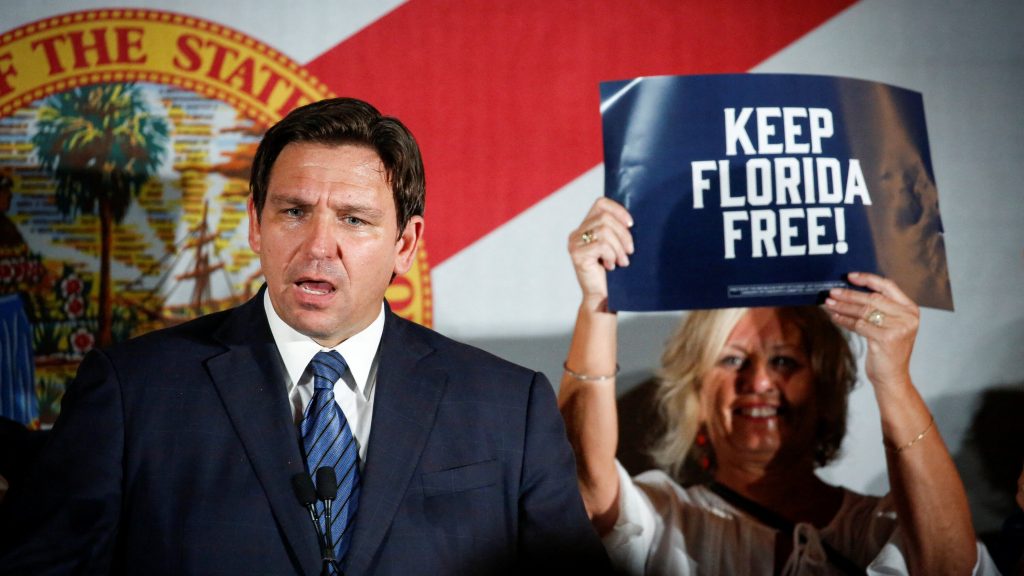By ESG McGill Analyst Mary-Michelle Brown

As the 2024 presidential election draws nearer, Democratic and Republican candidates are attempting to construct robust platforms to demonstrate their policy stances to voters on critical issues. Ron Desantis, the current governor of Florida, is no different. Known for his right-wing politics, he is a favourite for the Republican presidential nomination. On February 13th, joined by Florida Senate President Kathleen Passidomo and Florida House Speaker Paul Renner, Desantis took his latest stance against ESG investing by advancing legislation to “protect” Floridians from these practices. In his words, this announcement builds on his “commitment to protect consumer’s investments and their ability to access financial services in the Free State of Florida” (Desantis, 2023).
This is not Desantis’s first move towards anti-ESG legislation. In mid-January, he formally approved measures that sought to reform how investment decisions regarding the pension plans of employees of the state of Florida are taken. Most notably, these new measures prohibited the consideration of ESG factors in investment decisions at the state level. According to him, asset managers should be focused on earning profits for investors and nothing more. With the beginning of the legislative session in Florida approaching, Desantis used the meeting as a chance to formally advance his legislative proposal to make these changes permanent and build on previous restrictions.
The legislation’s primary goal, for the governor, is clear – to protect investment decisions from “woke” democrats who, in his view, seek to allow left-wing policies to infiltrate investment decisions at the expense of turning a profit. If approved by the Florida Legislature, this bill will restrict the consideration of ESG metrics in investments at the state and local levels, prohibiting the use of these metrics when issuing bonds. Furthermore, this legislation prohibits contractors and suppliers from looking at ESG considerations in the supply chain and restricts banks that engage in corporate activism from holding state funds. In sum, this proposed legislation essentially bans the use of ESG at the state and local levels, forcing investments to focus solely on returns, symbolizing a significant shift away from sustainable investing practices for Florida.
On the state level, Desantis is not the only republican promoting these ideas, as other red states are also seeing increasing anti-ESG sentiment. However, on the federal level, Biden is moving in a different direction by repealing Trump-era regulations against ESG investing. Most notably, these regulations prevented fund managers from considering ESG factors when making decisions about funds that were protected under the Employee Retirement Income Security Act (ERISA). Following an executive order by President Biden, the U.S. Department of Labour repealed these regulations in November of 2022, thus allowing these factors to be considered as of January 30th, 2023. Under the new regulations by the Biden administration, fund managers can now consider ESG factors when selecting investments, although they are under no obligation to do so. In addition, they are still obliged to place the financial interests of investors ahead of any other goals.
Unsurprisingly, most Democrats expressed their support for this change in ERISA regulations. However, many conservative members of congress and Republican-led states were generally less than pleased with these new regulations, which is clearly shown by the 25 states currently suing the U.S. Department of Labour. They argue that the Biden administration is attempting to advance their political agenda by considering ESG factors, thus sacrificing returns for hardworking investors. Even more conservative members of Biden’s party, such as Joe Manchin, opposed the change arguing that ESG investing leaves investors vulnerable to geopolitical risks. In his words, “it is irresponsible of the Biden administration to jeopardize retirement savings for more than 150 million Americans for purely political purposes” (CNN, 2023).
Although the new improvements to ERISA regulations are a healthy contrast with the former Trump-era ones, they are more conservative than Biden had hoped. Initially, his administration advocated for considering ESG and traditional factors in decisions instead of optional consideration. With the increasing likelihood of a potential showdown between Biden and Desantis, a staunch anti-ESG conservative figure, it will be interesting to see how debates surrounding ESG will play out and whether this could become a vital issue in the upcoming election.
